How do you miss spotting a container ship the size of three football fields? By plugging your ears with music while simultaneously reading a book, lounging on a small boat that doesn’t belong to you, and not noticing the humongous ship.
That’s how a fairly obnoxious British youth, aged 25 – left to man Abhilash Tomy’s yacht while the skipper took a small break after sailing overnight – contrived to ram the Bayanat into the ship, while hitching a lift aboard the Indian’s ride from Spain to France. This was around Independence Day, and retired Commander Abhilash was to start his second edition of the Golden Globe Race (GGR) – the 16-sailor solo, around-the-world race which uses only 1968 vintage technology – that started on September 4 at Les Sables-d’Olonne.
The Bayanat gets ready to sail.
Urmimala Abhilash-Nag, the Indian sailor’s wife, mother to his two pre-teen children and his biggest cheer-leader, recalls the tourist satellite call she received on August 15 – it trilled ‘Emergency’, a dreaded call by families of sea-farers, commercial or adventurous.
“There had been a collision with a ship. It was a newly refitted boat, and Abhilash knows those waters like the back of his hand. It was shocking the young man had behaved as if he was on a cruise, and gone on reading a book. Even if I sailed, I’d have spotted the ship a size of three football fields and not let the boat ram into it,” Urmi recalls of that panic she felt of his mishap during the two-day prologue sail from Gijon in Spain to France.
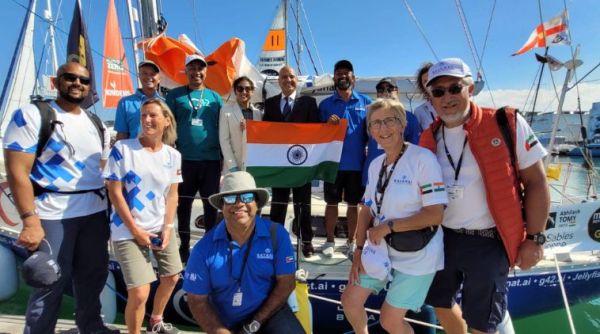 Abhilash Tomy with his support crew.
Abhilash Tomy with his support crew.
Later the youngster, who had tagged along for a lark, had had the audacity to ask Abhilash: “Why didn’t you insure your boat? My father would have paid you for damages.” Having run into one of the toughest accidents in the last edition in 2018, Abhilash was heading into the 2022 edition with renewed intent and a second-hand sailing boat patched up into shape by the maverick Dutchman Dick Koopman. Just like in the movies.
To then watch it go ram into a ship because a truant youth got immersed in his paperback and music, was a punch to the gut.
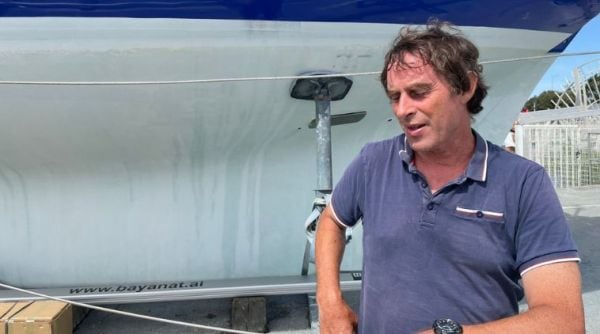 Dutch maverick yacht designer Dick Koopman.
Dutch maverick yacht designer Dick Koopman.
Also, a mangled blow to the boat’s snout. When the other sailors heard of it, everyone from current race-leader Simon Curwen to the top European sailors even volunteered to pitch in with 3000 USD each for repair costs. His Middle East sponsors hadn’t factored in for a head-on collision with a ship enroute the start. But it was a race against time – from August 17 to September 4, when a team of multi-national expert crew scrambled to get the yacht back into shape.
This last week has been one of the best for Abhilash, who has consistently been posting best distances, taking the absolute 7-day distance fleet record, gaining 210 miles on the leader as the fleet approaches Trinidade port. His second place had seemed unthinkable two months back when the collision happened.
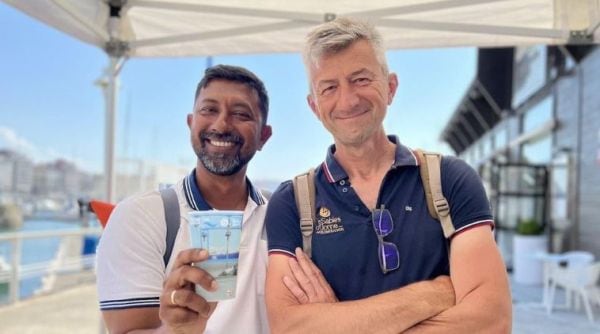 Abhilash Tomy with Ertan Beskardes, Turkish British, and fellow skipper, who’s supported him throughout.
Abhilash Tomy with Ertan Beskardes, Turkish British, and fellow skipper, who’s supported him throughout.
The GGR is filled with serious adventure sailors, backed by humongous resources and belonging to countries that boast of a long, affluent tradition of sea navigation – the French, Americans, Germans and Brits. A massage specialist is arranged for the French skipper when they dock, and their national teams actually do the homework for the top skippers. While the Indian Navy propelled Abhilash’s Sagar Parikrama – his ambitious circumnavigation, he has had to sort out a lot of logistics on his own in his individual GGR foray.
Far fitter, bolstered by an entitlement to rule the seas inherited from history, the top countries are better equipped. “But we see them fear Abhilash. He is one of the best at celestial calculations and his military training gives him the edge. When young he had all doors open – medical, engineering. But he chose this. And here he is, fighting second and challenging the leader.
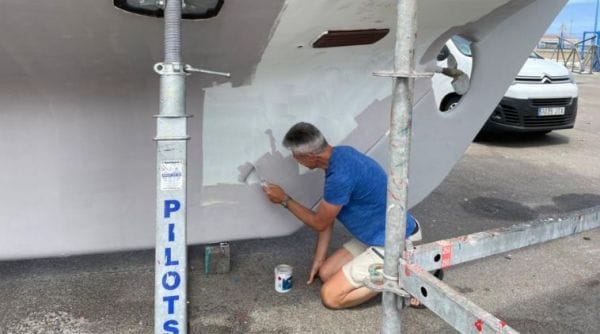 Fellow skipper, Ertan Beskardes, Turkish British, helps with the paintwork during the repairs after the collision.
Fellow skipper, Ertan Beskardes, Turkish British, helps with the paintwork during the repairs after the collision.
“Broken, repaired and now kicking butt,” Urmi says.
The Repairs by Super Koopman
Setting sail on his monumental adventure, Abhilash was leaving behind two pre teens, old parents, while ticking on the yacht checklist of safety and survival. You need to procure visas of 20 countries for self, and obtain permissions for the boat. Nobody has written prologues to Sindbad Or Gulliver, though Capt Ahab’s doomed preps and epilogue are well known, even if the whale runs away with his breakfast and dinner.
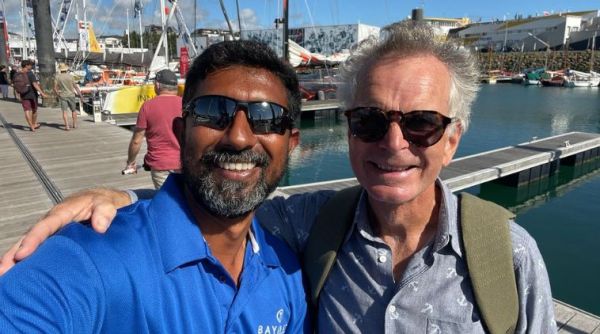 Belgian Paul Willaert who owns a Rustler 36 model just like Abhilash Tomy, and lent him a mold of the bow for the fibreglass repair.
Belgian Paul Willaert who owns a Rustler 36 model just like Abhilash Tomy, and lent him a mold of the bow for the fibreglass repair.
For Abhilash in the real world, his Covid lockdown days were spent locating a neat boat – passed down from French sailor Philip Peche. His Arab sponsors would agree to back him buy the second-hand Bayanat, but it would need a refit under Dutchman Dick Koopman.
Abhilash can’t bend in certain ways owing to the last accident, and the boat needed ergonomical alterations. Enter the super Koopman, who was boat designer of the 6’5″ Atlantic rower Mark Slats, one of the three sailors caught in the horrid storm in 2018.
While Abhilash and Gregor’s boats went under, Slat’s withstood the wreck. Koopman would respond to the collision, driving down to France, armed with a 3D printed vessel model, his kit and a coffee machine, from which he would sip endless cups without rest the next few days. He’d pack a few sandwiches, roll up his sleeves and supervise the fibreglass repair plus make the boat match-ready, a second time, mending his broken heart after the maddening collision.
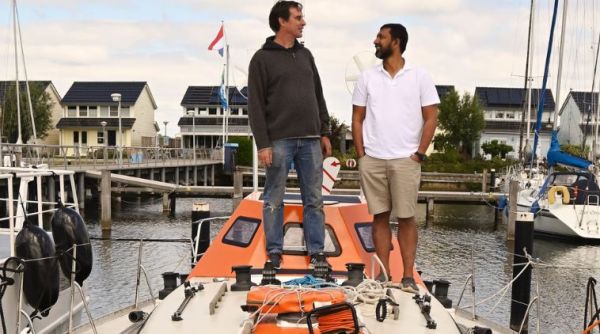 Abhilash Tomy (right) with and Dick Koopman.
Abhilash Tomy (right) with and Dick Koopman.
Two Belgian craftsmen from Jan Vandamme’s ship floor, Benjamin Welden and Ibe Steedman, would fetch up on extremely short notice for repairs of the mold of the bow (push) pulpit installation, working insane hours to add the last lick of paint. A fellow skipper’s manager, Jade Leaney, would oversee repairs of mast and furler, following the longtime maritime tradition of helping other vessels in need. France in the middle of holidays then meant a GGR volunteer, Maria Laicova, would help with French-English translation to ensure a smooth repair, haul out, transport and storage.
His brother Aneesh Tomy would land up, cook for him and help with anchor and wind vane repairs. Abhilash’s team manager, a feisty American lady, Sandra Shipp, would request the mayor of the city to rustle up support during their vacation month.
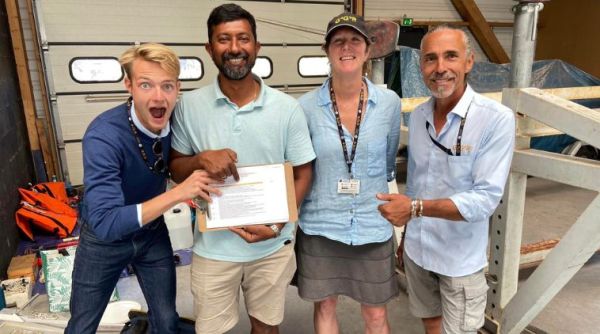 Abhilash Tommy receiving the the safety indpections certificate.
Abhilash Tommy receiving the the safety indpections certificate.
Urmi would reach out to her friends who were designers at Ferrari, and she recalls those zombie-like days before the race began. But Abhilash Tomy had managed a team of different nationalities pushing him to go on. “It was emotional watching these Dutch, Belgians, Germans, Arabs, Turks and Indians waving Indian flags when he set off. For them sea lovers, sailing is like cricket is to India. They love it. They were rooting for this Indian giving the big boys a fight.”
And then…came the doldrums
Abhilash’s last race had ended in a storm. His fate took off where he had left, it would seem. “That was the time of the Danielle Storm, conditions like a cyclone, and their start was a terror. It was an ordeal. From there they would hit the doldrums,” Urmi explains.
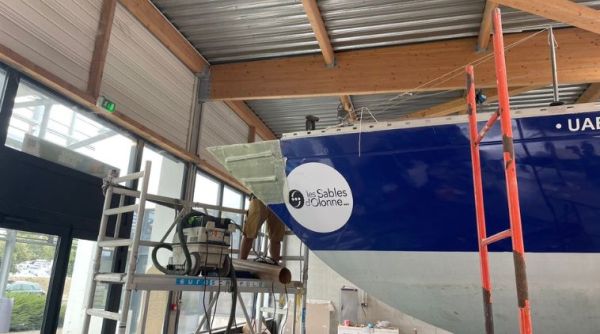 The Bayanat was fitted out with a new nose after the collision
The Bayanat was fitted out with a new nose after the collision
The upwind sailing out of Europe was followed by the nerve-wracking doldrums. True to its name, doldrums is the pits of conditions. “So it’s a no-wind zone along African deserts. Arid, hot, sand gets stuck in propellers. Basically no help from winds. And right after the storm,” Urmi explains.
Right at this moment, the sailors have set off in search of the ‘trade winds’; going along the South American coast and turning left is the plan to reach Cape Town from Trinidade. It’s a lot of calculation and decision-making to pick the route and exact turns by referring to weather fax maps. His Rustler 36 clocks high speeds and Abhilash is supposed to be one of the sharpest celestial navigators. “The Southern Ocean, Indian Ocean are his zone so to speak. So it’ll be an exciting next few weeks,” Urmi says. It’s still early days and seven months to go, but Urmi would like to believe the worst is behind them.
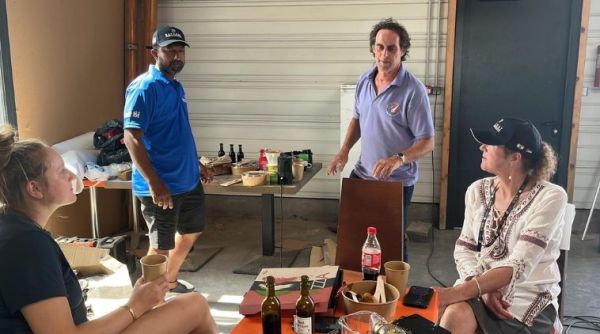 Team Repair: Abhilash Tomy, Dick Koopman and Ibe Steedman.
Team Repair: Abhilash Tomy, Dick Koopman and Ibe Steedman.
Meanwhile, communication is one of the most quaint parts of this race designed to mimic 1968 conditions. There’s the weekly satellite call, and sailors throw out analog films and a stack of letters for families and friends at the port. It’s a little antiquated in these days of hyper tech communication.
“We hold onto scraps of information, usually vague and late and not substantial. There were satellite calls back then too. But nobody commercialised it,” she says.
Urmi puts this contrived technology lag in this age of Insta into perspective, in the way only sailors’ families do.
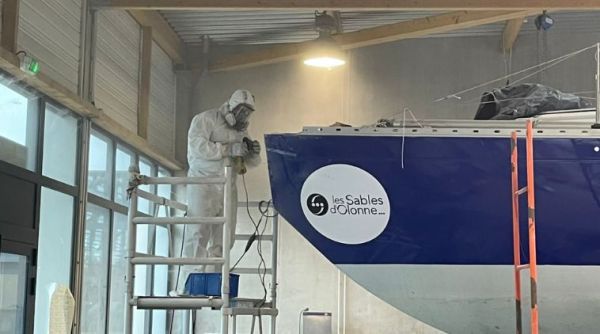 Belgian craftsman Benjamin Van Welden who came to France at short notice for the fibreglass repairs
Belgian craftsman Benjamin Van Welden who came to France at short notice for the fibreglass repairs
“We have come to depend in an unhealthy way on instant communication, so when the carpet is pulled from under our feet we struggle. There’s the analog method, and people have stayed afloat even in those days. It’s about staying connected mentally, physically, the old ways – I mean, we had oral narrations, recorded cassettes, which made us more human,” she says.
It’s also the best way to teach her kids what her husband does. “I want my kids to know that even in this digi age, we will still survive if internet is taken away. I want them to learn of human resilience, it’s what their dad does. My children have had a relatively privileged background. I want them to know 40-50 years ago, people still lived without all these modes. It’s about not taking the easy way out. I don’t want them to take the easy way out.” Snail mail from their sea-faring father is their unique life-skills education. “He is fighting and kicking ass out there, isn’t he?” she ends.





